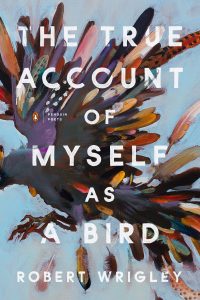Robert Wrigley: Review by Margie Kersey
 Robert Wrigley, The True Account of Myself as a Bird (Penguin Books)
Robert Wrigley, The True Account of Myself as a Bird (Penguin Books)
The World Is Waiting
Think about your normal day. If you are like most of us, you got up, drove to work in traffic, worked at a computer, desk, or shovel, picked up fast food for lunch, worked some more, and drove home. This is normal. In his newest collection of poems, The True Account of Myself as a Bird from Penguin Books, Robert Wrigley reminds us that this isn’t normal at all. There was a time humans were connected to the earth and felt the rhythms of the world. But many of us have moved away from nature and live in a concrete world with no grass between our toes. We have lost that intimate connection. Wrigley reminds us of what we are missing. He reminds us of the magical beauty in the world that we might take for granted. He points a finger at the tiny everyday miracles of nature that might go unnoticed, like this example from “Old Pan”:
Windblown seedpod parasols lofted
from a withered western salsify blossom drift past me
in a cloud of silken Tinker Bells, a shitload even. Forgive me.
Wrigley takes us back to childhood when we noticed the world’s magic and how it stirred our imagination. He encourages us to reconnect to that lost time. But this isn’t a lament of a lost childhood; this is a vision of one man’s continuing connection to the earth. We get generous glimpses of what it is like to live with nature. Cleaning the chimney pipe after a snow, watching mice in a bone pile, and the ecstasy of rain after a long dry spell. This is life in harmony. He knows that we might not remember, so he is careful to take our hand and guide us along the journey. In “Machinery,” he lets us know his father had the same questions we do:
The question he did not ask, that would have
embarrassed him to ask, the question I knew
he wanted to ask, the one I was too embarrassed
to ask for him, was “What does it do?”
This collection answers that question—it connects us. These poems track the pulse of life in us and around us. We get to feel what it is like to have a doe wander into the yard and listen to our music. We revisit what it is like to comfort a new puppy. We wonder at a herd of buffalo. We watch an owl spying his prey and reflect on our place in the world. Life is more than eight hours at a desk and watching television. Sometimes it is a sunset of blues that we can’t name. Wrigley reminds us that life is on the other side of the window. It is in our garden, our yard, and the song of a bird.
But nature is more than trees, deer, and birdsong. Wrigley shares memories of friends lost, his father, the assassination of John F. Kennedy, and even trying on size 16 red high heels. We discover what “ackumpucky” is and learn that “ricasso” and “choil” mean the same thing. His poems include all of life as it rolls out before us. Noticed and unnoticed. We are invited to look at the world through his eyes and reconsider what we see every day. We are invited to join him in celebration and song in “Chorus”:
If you’re singing, and the worst thing
that could happen at such a time is for the song to end.
So I keep singing “She loves you, yeah-yeah-yeah.”
He asks us to keep singing because we are part of that wonder. The world is waiting.
Based in Georgia, Margie Kersey is a silver-haired college student who is reinventing her life. Again.